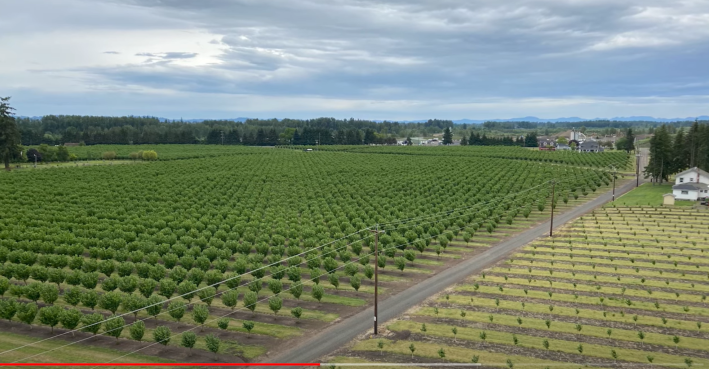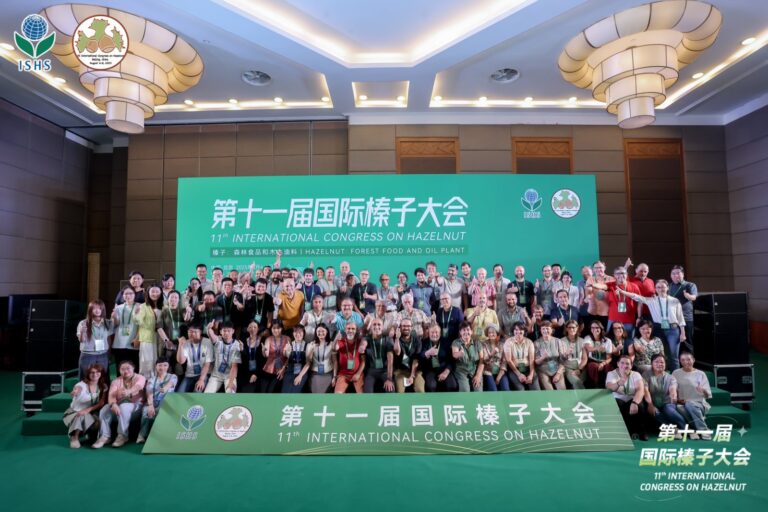EBRD and EU foster hazelnut production in Georgia
Hazelnuts are a major product for agriculture in Georgia. As one of the country’s top 10 export commodities, they are a source of income for more than 50,000 farmers and dozens of processing facilities.
The country’s subtropical climate by the Black Sea shore offers particularly favourable conditions for their growth, luring international confectionary giants such as Ferrero to invest in local production.
“The livelihoods of around half of the Samegrelo region’s population are closely linked to hazelnut farming. In villages, almost everyone grows them. Cultivating hazelnuts is what helped us overcome the hardships of the 1990s,” said Demur Ardia, owner of SRT, one of the processing facilities in the Samegrelo region, the main homeland of hazelnut plantations and orchards in Georgia.
After more than 22 years in the business, Mr Ardia only recently decided to open his own hazelnut processing facility. For two years in a row his company has ranked among the top hazelnut exporters in terms of volume, exporting mainly to Germany and Italy, sometimes to the Czech Republic.
“Turkey is the world’s biggest producer and exporter of hazelnuts, it sets prices worldwide. Georgian hazelnuts are often sold at a discount compared to Turkish ones, so our focus should be on productivity and quality to achieve higher prices and a bigger piece of the pie,” said Mr Ardia.
The EBRD and the European Union (EU), under its EU4Business initiative, support Demur Ardia and other small and medium-sized entrepreneurs with similar drive and passion in Georgia, Moldova and Ukraine to help them to secure that bigger piece of the pie.
Each of these three countries benefits from the free trade area with the EU, the world’s largest trading block with 500 million consumers, according to the EBRD.
Access to finance and knowledge
Competitive small and medium-sized enterprises (SMEs) are considered the backbone of any economy and Georgia’s is no exception. While the country has made significant progress outperforming other EU Eastern Partnership countries in creating a favourable institutional and operational environment for SMEs, challenges remain.
Enhanced access to finance, deeper knowledge of export market opportunities and boosting innovation are considered crucial for further SME growth.
The EBRD and the EU help SMEs in Georgia, Moldova and Ukraine to integrate European standards in their work by investing in production upgrades, boosting growth and increasing competitiveness not only on the European market but their local market as well.
Through partner banks, the EBRD provides credit lines for companies to foster stronger economic ties with the EU, which are complemented by grant incentives by the EU under its EU4Business initiative.
SRT is one of many companies that have been supported by this initiative, where they have been able to invest in modern equipment to ensure European quality standards for the final product, as well as receiving 15 per cent cashback on the whole investment.
SRT was also supported by advisory services through the EBRD SME Finance and Development Group, a complementary programme that also benefits from EU funding. The company was able to adopt standards to improve their overall food and hygiene quality and obtain the relevant ISO certificate, a universal recognition of compliance with global norms.
Similarly, NUTSGE another nut processing company in the same region and also with trade partners in Europe, has benefited from advisory services to integrate their information management system so their business processes are managed on a single platform.
“The new system helps us to get hold of all information and track it, along with strengthening the company’s reliability and cooperation with our European partners and consumers, “said Thea Kukhalashvili, NUTSGE Marketing Manager.
”As is often the case, drastic upgrading in one area has created momentum for innovation and continuous improvement in others. We are looking into ways to make our operations even more efficient and to become more technology-savvy.”
“It is great to see Georgian SMEs benefit from opportunities provided by the DCFTA. The European Union is ever more committed to supporting innovative entrepreneurs. I hope that Georgian small and medium businesses will continue making good use of the support we offer through the EU4Business initiative and other programmes,” said Janos Herman, Ambassador of the European Union to Georgia.
What’s next for Georgian hazelnuts?
For the past few years, Georgia has proudly secured its place in the list of top five hazelnut producing countries worldwide. But a recent severe attack of the agricultural pest brown marmorated stink bug made the lives of Georgian farmers more difficult and the ambitions of greater exports bleaker.
According to preliminary estimates last year hazelnut exports dropped by more than 50 per cent. While the epidemic is not the sole cause, it played a large role in reducing hazelnut exports in both physical and monetary terms.
After surviving the winter, the bug is expected to travel to the eastern part of the country, to the wine region – another vital source of income for Georgia.
To fight the pest outbreak, the EBRD has teamed up with the Ministry of Environment Protection and Agriculture of Georgia in its efforts to spread information among farmers through various channels including traditional and social media.
Multimedia lessons and tutorials are available to teach crop growers the most effective means, both chemical and mechanical, to combat and manage the pest outbreak.
“It is paramount that the state, international organisations and local farmers join forces to overcome this disease,” said Mr Ardia. “This outbreak cannot be managed only by handful of farmers. A united front is needed, along with more information and assistance to the hazelnut sector. Georgia is a small country and hazelnuts are a precious commodity for us.”
“We are delighted to cooperate with Georgia’s Ministry of Environment Protection and Agriculture on yet another initiative that tackles the very pressing challenge Georgian farmers face today. This new initiative will bring Georgian producers closer to knowledge and information to fight the outbreak of the agricultural pest,” said Bruno Balvanera, EBRD Director for the Caucasus, Moldova and Belarus.
“Georgia has a long tradition of farming and its hazelnuts are known and demanded worldwide. The Free Trade Area with the European Union opened the door to opportunities for Georgian farmers, and we stand ready to assist them in increasing yields and improving the quality of produce.”
Copyright: finchannel.com






